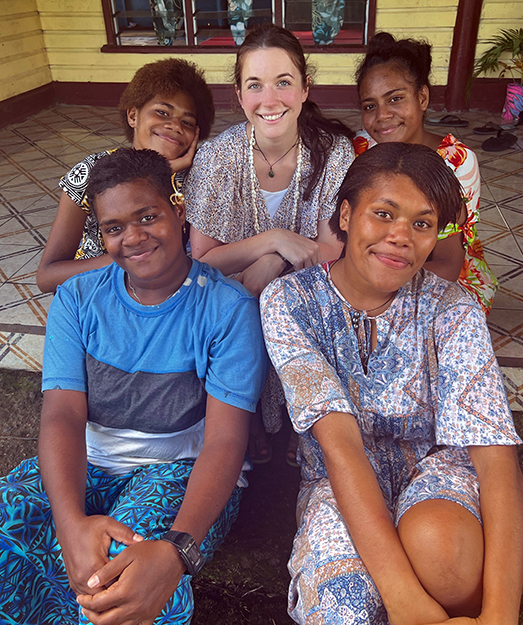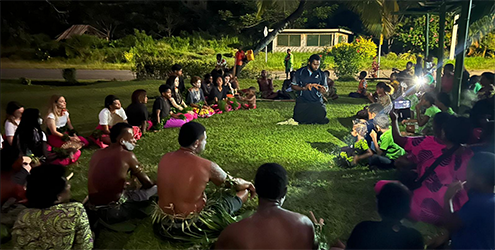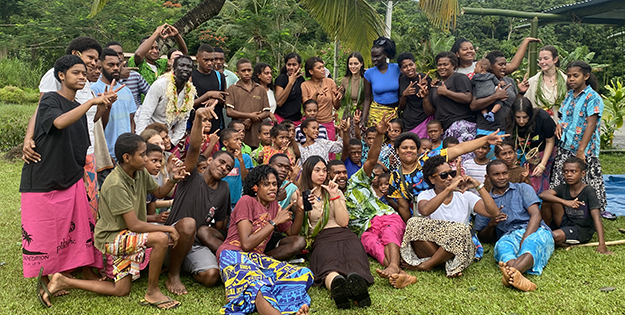Future student
Copyright@ Australian Catholic University 1998-2024 | ABN 15 050 192 660 CRICOS registered provider: 00004G | PRV12008
Copyright@ Australian Catholic University 1998-2024 | ABN 15 050 192 660 CRICOS registered provider: 00004G | PRV12008

It’s mid-May, the beginning of the dry season in Fiji, and the people of Dama Village are getting ready for a ‘meke’, a traditional ceremony that serves to signify and celebrate an important event. Preparing alongside them are nine ACU students who have been staying in the village as part of a 16-day immersion program. Village elders tell them this is the first meke in Dama for more than 20 years.
“To be part of this special ceremony, it is truly quite an honour,” says Augustino Daw, a final-year Bachelor of Youth Work student who was part of the tour, run by ACU in partnership with the Fiji-based volunteer organisation Think Pacific. “The village elders have actually created this new meke for us, to signify the work we’ve done with the youth in the village, and that is quite humbling.”
In Fiji, traditional mekes are generations-old and considered to be sacred. Contemporary forms of the ceremony are sometimes created to mark special events, as was the case with the ACU cohort that visited the village to conduct a range of empowerment workshops with local youths.
Not only was the ceremony a first for the students involved and for Think Pacific; it was also a novel occasion for many of Dama’s younger inhabitants.
“It was incredible to be able to share this with the young people of Dama and the other ACU students, because it was a new experience for all of us,” says Georgia Kane, a final-year student who was on the study tour as part of her Bachelor of International Development Studies.
“The elders really emphasised the significance of the meke and the importance of maintaining that tradition and their cultural heritage more broadly, especially at a time when many young people are moving away from the village, which makes it harder for them to maintain those practices and stay in touch with their roots.”
In the days leading up to the meke, the students joined locals in learning the different elements of the ceremony, including dancing and telling the story of their time together in Dama.
As part of traditional protocol and due to the significance of the meke, several local dignitaries attended to watch them perform the ceremony, including the provincial chief, district representatives, and heads of neighbouring clans.

The meke ceremony involving Dama residents, ACU students and the Think Pacific team.
The meke included the presentation of a whale’s tooth, known as a ‘tabua’, which in Fiji is considered a symbol of acceptance, respect and esteem.
The Fiji immersion was “something the students will never forget”, says Dr Jen Couch, senior lecturer at ACU, and demonstrates the impact that students can have on short-term international placements.
Representatives of Think Pacific echoed this sentiment, saying the organisation was “immensely proud of all the volunteers involved in what is a great honour and a real privilege”.
Dama is in many ways typical of remote villages in Fiji. People’s livelihoods depend mainly on citizen agriculture, with a variety of family-run farms consisting of traditional climate-resistance root crops like cassava and dalo, and seasonal fruits like watermelon, papaya, banana, mango and pineapple.
While rural-to-urban migration has been rising in Fiji in recent decades, many young people in Dama plan to stay in the village to manage their family businesses.
“Quite a few young men in the village already have their own farms, some of them as young as 14 or 15 years old, so they actively farm while also studying at school,” says Georgia, who will soon visit Fiji again as part of an internship for the prestigious New Colombo Plan Scholarship, which will also include stints in Tuvalu and Kiribati.
“Other students we spent time with expressed desires to go off and do further study in Suva. There’s a young woman who wants to go to university and become a doctor, and others who want to be architects and electricians.”
Some villagers who had left to study in Suva later returned to the village with university degrees, bringing knowledge back to the community.
“I spent some time with a man who graduated with a degree in business management, and he’s now back in Dama teaching young people how to initiate and manage a business in a sustainable way,” says Augustino, who has extensive experience working with young people in community development and sports leadership.
“There is definitely a scarcity of resources in Dama, but the people themselves are very resourceful. There are some bright young minds in this village, and they were very receptive to the workshops we led and very open to the topics we discussed.”
The nine ACU students who travelled to Fiji ran structured learning sessions on topics such as public health, sports development, mental health, leadership, business enterprise, and climate change.
With the issues of rising sea levels, coastal erosion and reduced crop yields posing an imminent threat to Fiji and other Pacific Island nations, young people have often had the loudest voices in response to the climate crisis.

“Climate adaptability and resilience is really important to many of the young people in the village,” says Georgia, who as part of her scholarship will conduct honours research focused on climate change at The University of the South Pacific.
“They form part of quite a large youth movement in the wider Pacific region that incorporates local knowledge and lived experiences to open conversations on the climate crisis, but unfortunately they don’t always feel like their concerns are taken seriously.”
As an inland village, Dama is in a less precarious position than many coastal towns in Fiji; to date, six Fijian villages have had to be relocated due to climate change. However, the crisis has had an impact on agricultural productivity in Dama, with longer dry seasons and an increase in extreme rainfall events.
“It has led to issues like crop failure and root rot, severely impacting economic activity and their ability to trade – and that’s a problem in many parts of the South Pacific,” says Georgia, adding that some measures taken to combat these changes had proven successful.
In Dama, many farmers have turned to traditional knowledge, transitioning away from synthetic fertilisers and insecticides and instead utilising composting to facilitate improved soil fertility. They’ve also planted certain trees and grasses along riverbanks to prevent landslides and soil erosion.
Georgia says the perspectives of young Pacific Islanders were crucial in shaping future dialogue on climate change.
“The climate crisis directly impacts young people in many different ways, so I think that incorporating young Pacific voices in the regional and global dialogue is incredibly important,” she says. “At the end of the day, there is nobody better placed to guide those conversations than the people actually experiencing the issue.”
In reflecting on the Fiji immersion program, the ACU students stressed that the knowledge-sharing and learning was a two-way exchange.
“It was definitely a mutually-beneficial experience,” says Augustino Daw, who since leaving Fiji has stayed in touch with the Dama community.
“I know for me personally, it was rewarding just to see the effect we had on the young people, to realise that we opened discussions and maybe instigated some positive change in the village. But also, in speaking with the other students and reflecting on our shared experience, we realise how much we all learned in the time we spent there. It’s something that will stay with us for a very long time.”
Keen to make a positive impact in youth work or international development? Explore the options.
Copyright@ Australian Catholic University 1998-2024 | ABN 15 050 192 660 CRICOS registered provider: 00004G | PRV12008